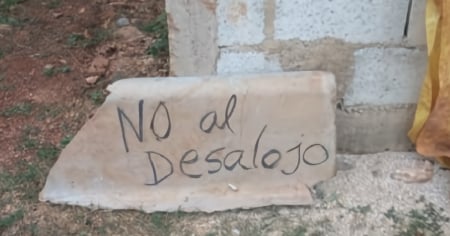Professor Pedro Albert Sánchez received a visit at his home on January 16 from a high-ranking official of the Cuban political police, who goes by the name Major Denis. The State Security officer came to propose changing his extrapenal license, which is valid for one year and expires in November 2025, for conditional freedom. "I did not accept it. I did not sign. I didn't even read it. They are not going to use me as merchandise to remove Cuba from the terrorism list."
According to Professor Albert, there are two reasons why he cannot accept a deal with the regime's political police. The first is accepting that he committed a crime by protesting on July 11, 2021, "and that did not happen," he says in a video shared on his wife Ana Elvis Amaya's Facebook wall.
The second reason is that if he accepts, it could be interpreted as "they are right in what they are doing, that it is well done and that they defend justice," he added in reference to the release of 553 prisoners that the regime has agreed upon with the Vatican, coinciding with the end of Joe Biden's term and Cuba's removal from the list of state sponsors of terrorism.
Professor Albert clarifies that if State Security had come to his house several days ago, before the Díaz-Canel regime was removed from the list of state sponsors of terrorism, he might have accepted it because his health has been progressively deteriorating.
"At first, I improved a lot during the first month (on the outside), but my health has deteriorated again. So much so that at the oncology clinic, I not only have to address the prostate issue—which, by the way, there's no reagent available for the PCA the last few times I've gone—but I also need treatment for my mouth, as I'm having difficulties. I also scheduled an appointment for head and neck. If they had come a few days earlier, I believe that at my age, with my health progressively worsening, I might have signed because I think I've done all that I can, and I also believe that others will have to continue doing what I can no longer do. However, when it comes to merchandise to take Cuba off the terrorism list, they won't get me," he stated.
"That's why I didn't sign. That's why I'm not going to sign, and that's why I'm willing to go to prison once again and even face death. It's that simple."
However, Pedro Albert does not judge those who have accepted the conditions they were presented with for their release. "I am very respectful. My position was not to accept it. There are already people who criticize Ferrer for whether he accepted or not. When José Daniel Ferrer was imprisoned so many years ago, I was raising my children without looking for trouble. That’s why I take my hat off to Ferrer a thousand times over and I feel immense joy that he is out of prison. I don’t know what conditions he accepted or if in his case it was unconditional. Friends, brothers, and sisters: one must spend day after day behind bars to understand how far the human mind can go. If I had been 37 or 40 years old and raising two small children, I might have accepted. That’s why I don’t want to put myself in anyone’s shoes. I don’t want to put words in anyone’s mouth. I am sharing my opinion. I would have liked others, just as I have done, to do what I did. That would have been my greatest wish, but it is not what I am asking for."
To those who have praised his courage, Albert reminds them that "when you have convictions, courage follows. I am well-disposed. Don’t see this as a big deal. My attitude is not something everyone should adopt. Each person should have their own criteria and take their own stance. And be respectful of what others do," he concluded.
Professor Pedro Albert Sánchez, 67 years old, suffers from prostate cancer and was imprisoned for several months following the wave of repression that emerged after the protests on July 11 in Cuba, in which he participated. In December 2023, he was incarcerated again when a court revoked his limited release (he is sentenced to five years). During his last stay in prison, he refused to wear the prisoner uniform and went on a hunger strike at 1580, San Miguel del Padrón. He is recognized by Amnesty International as a prisoner of conscience.
Filed under:
